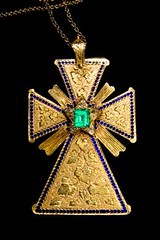
PREV ARTICLE
NEXT ARTICLE
FULL ISSUE
PREV FULL ISSUE
MORE ON THE GEN. WILLIAM HAINES LYTLE MEDAL
In an E-Sylum article last week I asked, "Can anyone tell us about Gen. Lytle's medal? It wasn't pictured. Was it awarded to him earlier in the war, or was it actually a posthumous medal?"
Jeffrey P. LaPlante submitted the following detailed response. Thanks! -Editor The Brigadier Gen. William Haines Lytle medal referred to in the article was in fact given to him just 11 days prior to his death by the 10th Ohio Infantry he served with during the Civil War. The medal is a Maltese cross and was presented to the General while on military duty in 1863. Whitelaw Reid's biographical sketch of Lytle (Ohio in the War, Volume I, page 881) summarized the event:
"A few weeks before the battle of Chickamauga Lytle's old regiment, then on duty as head-quarters guard for General Rosecrans, presented him with an elegant testimonial of their regard, in the shape of a Maltese cross of gold, studded with diamonds and emeralds. The spot selected for the presentation was a most picturesque valley among the Alabama hills, and surrounded by his present and his old command, and by ladies, and officers of rank. The hero, with a graceful elegance so peculiarly his own, acknowledged the tribute."
He acquitted himself with honor and bravery while in a fight at Carnifex Ferry in September of 1861 and was wounded in that battle. He returned home to recuperate and then was made the Commander of a prisoner of War camp in Bairdstown, Kentucky. He again used his considerable political and military connections to secure a position as Brigade commander under Maj. Gen. Ormsby Mitchell's division where he again managed to get himself wounded and taken as a prisoner of War. He was made party to a prisoner of War exchange and again returned home to recuperate. You would think at this point the man would have the good sense to realize that this was not baseball and the three strikes and you're out rule does not allow you to come back and play a double header next week. But no, the General again assumes command of a Brigade of Infantry under General William S. Rosecrans at that time. As you probably guessed he was mortally wounded at the Battle of Chickamauga in Georgia while leading a counter attack on horseback. William Haines Lytle was also a poet of some notoriety and his famous poem Antony and Cleopatra, and others were read at night around the living rooms of all Americans, both Southern and Northern. While he laid dead on the field of battle Confederate soldiers read his poems while standing guard over his body, a testament to the courage of the man. This passage is from one of Lytle's most famous poems, Antony and Cleopatra:
'And for thee, star-eyed Egyptian!
The hill where he died is now known as Lytle hill in the Chickamauga National Military Park. Lytle referred to the medal in a letter to his sister on 16 August 1863: "I almost forgot to say that my cross was presented in due form a few days since by the officers of the 10th a delegation of whom came away down here [to Bridgeport AL] for the purpose." This was one of his last letters the great General would write and six weeks before his death, when presented the Maltese cross by members of his old regiment, Lytle ended his speech in this fashion: "That the day of ultimate triumph for the Union arms, sooner or later, will come, I do not doubt, for I have faith in the courage, the wisdom, and the justice of the people. It may not be for all of us here today to listen to the chants that greet the victor, nor to hear the brazen bells ring out the new nuptials of the States. But those who do survive can tell, at least, to the people, how their old comrades, whether in the skirmish or the charge ... died with their harness on, in the great war for Union and Liberty."
To read the earlier E-Sylum article, see:
CINCINNATI GOLD EXHIBIT
(www.coinbooks.org/esylum_v13n08a26.html)
The Numismatic Bibliomania Society is a non-profit organization promoting numismatic literature. See our web site at coinbooks.org. To submit items for publication in The E-Sylum, write to the Editor at this address: whomren@gmail.com To subscribe go to: https://my.binhost.com/lists/listinfo/esylum All Rights Reserved. NBS Home Page Contact the NBS webmaster 
|

